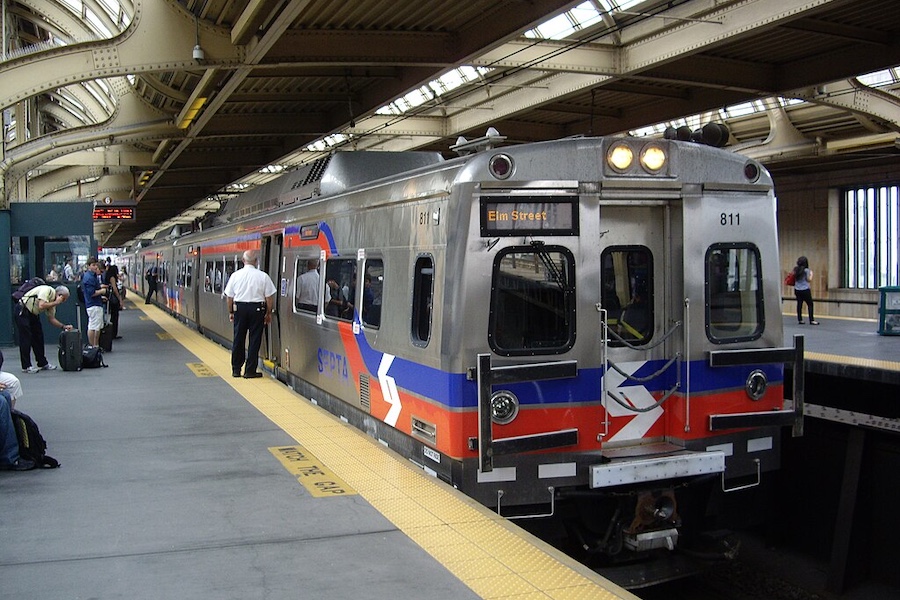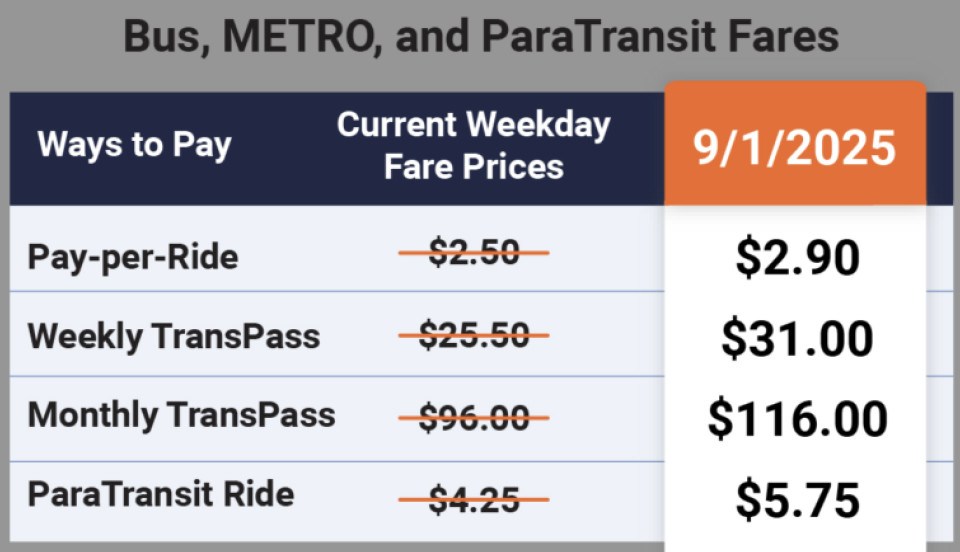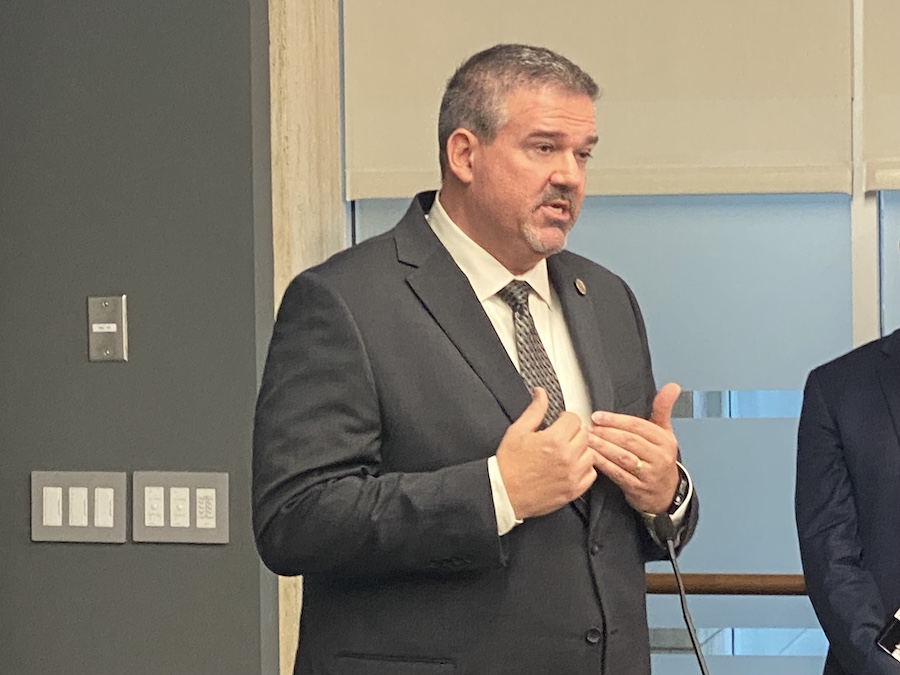SEPTA Unveils New Budget: 5 Regional Rail Lines Gone, 56 Bus Routes Slashed, and the Highest Fares in the Country
All this can be avoided, the agency says, if Harrisburg can agree on a budget that funds mass transit statewide.

Five Regional Rail lines will cease to run under the fiscal 2026 SEPTA budget released today. So will 56 bus routes. And the routes that remain will have their service truncated or sharply reduced. / Public domain image via Wikimedia Commons
SEPTA’s “annual going-out-of-business sale” has returned with a vengeance, set to go into effect July 1st. Interim general manager Scott Sauer delivered this news at a 10 a.m. press conference where the agency unveiled its austerity budget for fiscal year 2026.
Under SEPTA’s new budget, the agency plans to raise transit fares by more than 20 percent and cut service by 45 percent.
Here’s the timeline for the cuts and hikes:
August 24th: Thirty-two bus lines — half in the city and half in the suburbs — will cease operating. An additional 16 — 10 in the city and six in the ’burbs — will have their routes cut back, and service will be reduced on 12 of the 13 SEPTA Metro lines, all Regional Rail lines and 63 bus routes, 46 of those in the city, including the two Night Owl buses that replace the B1 (Broad Street) and L1 (Market-Frankford) rapid transit lines. In addition, all special-event transit services such as Sports Express trains will end.
September: SEPTA extends its current management hiring freeze to operating personnel. Base cash fare will rise from $2.50 to $2.90, tying SEPTA with the New York MTA for the title of highest base fares in the country.

Graphics courtesy of SEPTA
January 1, 2026: All five of the Regional Rail routes that run on Amtrak-owned tracks — the Chestnut Hill West, Cynwyd, Paoli/Thorndale, Trenton and Wilmington/Newark lines — will cease operations. Rapid transit route B3 (Broad-Ridge Spur) will cease operations along with an additional 18 bus routes, four of them and the two Night Owl buses located in the city. Trolley routes G1 (former Route 15 from Port Richmond to Overbrook via Richmond Street and Girard Avenue) and T1 (former Route 10 from City Hall to Overbrook via Lancaster Avenue) will be permanently converted to bus operation. And all remaining SEPTA Metro and Regional Rail lines will cease service at 9 p.m. every night.

SEPTA interim general manager Scott Sauer at today’s news conference / Photograph by Sandy Smith
“Like mass transit agencies across the country, SEPTA is facing a structural budget deficit due to a combination of the ending of federal COVID relief funds and increases in the day-to-day costs of providing service to our customers,” Sauer said at the news conference. “SEPTA has been preparing for this looming funding crisis by cutting costs and generating new revenue. And thanks to these efforts, we’ve managed to reduce our budget deficit to its current state of $213 million.”

But, he continued, SEPTA cannot significantly reduce this deficit just by trimming fat. It will have to cut into muscle. And that, he said, would eliminate the ridership and revenue gains the agency has posted since the end of the pandemic.
“The economic activity of the Southeast region powers Pennsylvania like no other, and none of that is possible without SEPTA getting people to work, to school, to medical appointments and to other destinations. If we’re forced to start dismantling the system in the coming fiscal year, SEPTA will shift from driving the region’s economy to holding it back.”
SEPTA estimates that the service cuts and fare hike will lead to a $19.9 billion loss in household property values across the region, more than 76,000 potential jobs and $6 billion in potential earnings lost, and an $11.4 billion net present value loss in tax revenue.

However, Sauer said, none of this will be necessary if the General Assembly passes Gov. Josh Shapiro’s proposed fiscal 2026 budget, which includes adequate funding for mass transit statewide. Sauer thanked the region’s Harrisburg delegation for standing together in support of SEPTA, and he also thanked both Philadelphia Mayor Cherelle Parker and the four collar-county governments for increasing their contributions to the agency’s operating budget.
The Democratic-controlled House has voted to approve the governor’s budget, but the Republican-majority Senate has so far refused to do so. Last fall, when Shapiro flexed state highway funds to plug a $153 million hole in SEPTA’s budget, some in attendance at the announcement identified paying for the funding as the sticking point. State Senate leaders are pushing legislation they have sought for at least a year that would allow ”games of skill” — the slot-machine-like video games found in bars and convenience stores across the state — to be taxed and regulated.
Sauer said that he is comfortable working with state Senate Majority Leader Joe Pittman (R-41st District) and anyone else who is working on ways to address both the Commonwealth’s structural deficit and those of its transit agencies (Pittsburgh’s announced a similar austerity budget last week), but that absent a solution to the state budget deficit, SEPTA must balance its budget anyway, and that will mean drastic service cuts. And not just in Southeastern Pennsylvania: “There’s transit in all 67 counties of the Commonwealth, and each one of them will be faced with the same problem we’re talking about here,” he said.


